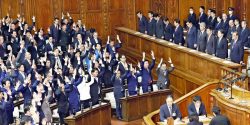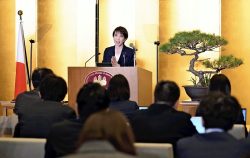- Yomiuri Editorial
- Closing of ordinary Diet session
Despite some legislative achievements, discussion of thorny issues lacked depth
11:37 JST, June 16, 2022
It is regrettable that while deliberations on the budget and bills progressed smoothly, discussions on many challenges have been left half-baked.
The ordinary Diet session has closed. A total of 61 bills submitted by the government have been enacted. It is the first time in 26 years that all the government-initiated bills were passed into law at an ordinary Diet session. This may be because the government has refrained from submitting bills that could cause controversy ahead of the approaching House of Councillors election, and also because some opposition parties have cooperated with the enactment of the bills.
The enactment of the economic security promotion law, which aims to strengthen the nation’s important industrial base, and the establishment of the child and family agency, which will serve as a command center for measures against the declining birth rate, can be seen as achievements. It is also noteworthy that Prime Minister Fumio Kishida endeavored to answer questions conscientiously.
The fact that commissions of the Constitution in both houses of the Diet actively discussed constitutional issues is a major step forward. It is hoped that each party will quickly consolidate opinions within the party and direct such efforts to the compilation of their own drafts for revising the Constitution.
The international situation is chaotic and the future of the economy is uncertain, but it cannot be said that the ruling and opposition parties have delved into such difficult issues and discussed them sufficiently.
A supplementary budget for fiscal 2022 totaling ¥2.7 trillion was approved in May to deal with soaring prices. However, the government did not present any medium- to long-term measures. The Constitutional Democratic Party of Japan, the largest opposition party, merely criticized the budget as too small.
Although an electricity shortage is expected this summer and later, the government’s measures to secure the electricity supply remain unclear. The government cannot afford to turn its back on discussions about restarting nuclear power plants purely over fears of possible opposition.
A system under which lawmakers received a ¥1 million monthly allowance, intended to cover the costs of documents, correspondence, travel and accommodation, has changed its name to indicate that it covers the costs of research and study, public relations and accommodation. Also, the calculation of the payment was changed from a monthly basis to a daily basis. However, rules for disclosure and restrictions on the use of the funds were shelved at the ordinary Diet session. The Diet cannot escape reproach for negligence.
Another problem is that a question-and-answer session among party leaders centering on Kishida’s policy speech was never held during the Diet session.
The government has set the schedule for the upper house election with the official start of campaigning on June 22 and voting and ballot-counting on July 10. This is an opportunity to make an interim assessment of Kishida’s handling of his administration.
The Kishida Cabinet has maintained high approval ratings, but some critics say it has no effective economic policies. Kishida needs to clearly present a road map to boost national economic power through debates in the upper house election campaign.
Meanwhile, it is important for opposition parties to come up with realistic policies and present a national vision that can counter that of the LDP-Komeito administration.
The CDPJ tried to dispel its image as a party obsessed with criticism by proclaiming itself to be a proposal-making party, but it has yet to take a firm line due to internal conflict. As the party promoted a united front with the Japanese Communist Party in last year’s House of Representatives election, many voters critical of the administration supported Nippon Ishin no Kai (Japan Innovation Party). The upper house election will be a crucial moment for the CDPJ.
The Democratic Party for the People has made a compromise with the ruling parties by approving the initial budget for fiscal 2022 and the supplementary budget. There is a possibility that the political situation will become more fluid after the upper house election.
(From The Yomiuri Shimbun, June 16, 2022)
Top Articles in Editorial & Columns
-

40 Million Foreign Visitors to Japan: Urgent Measures Should Be Implemented to Tackle Overtourism
-

University of Tokyo Professor Arrested: Serious Lack of Ethical Sense, Failure of Institutional Governance
-

China Provoked Takaichi into Risky Move of Dissolving House of Representatives, But It’s a Gamble She Just Might Win
-

Policy Measures on Foreign Nationals: How Should Stricter Regulations and Coexistence Be Balanced?
-

PM Takaichi Should Help Young Japanese Break Seniority Barrier to Vitalize Politics
JN ACCESS RANKING
-

Japan Institute to Use Domestic Commercial Optical Lattice Clock to Set Japan Standard Time
-

Israeli Ambassador to Japan Speaks about Japan’s Role in the Reconstruction of Gaza
-

Man Infected with Measles May Have Come in Contact with Many People in Tokyo, Went to Store, Restaurant Around When Symptoms Emerged
-

Prudential Life Insurance Plans to Fully Compensate for Damages Caused by Fraudulent Actions Without Waiting for Third-Party Committee Review
-

Woman with Measles Visited Hospital in Tokyo Multiple Times Before Being Diagnosed with Disease




















